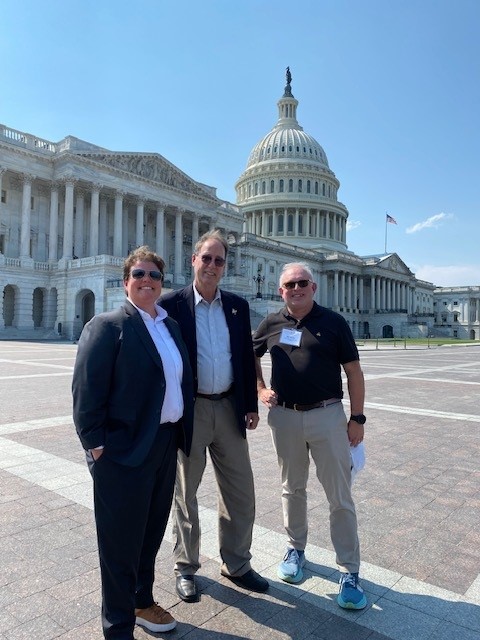Government Relations Update – July 2024
Federal
Biden Leaves the Race, VP Harris the Likely Candidate: On July 21, President Biden announced his decision to remove himself from the 2024 Presidential race and endorsed his Vice President, Kamala Harris to run in his place. Vice President Harris still must be nominated as the party’s official presidential candidate at the Democratic National Convention which takes place August 19 – 22 but as of now it is looking like it will be a race between former President Donald Trump and Vice President Kamala Harris.
Congress Continues Work on Funding the Government for 2025: Since June, the House of Representatives released more details for the Labor, Health and Human Services, Education, and Related Agencies bill (better known just as L-HHS), which includes the funding levels for the federal hemophilia programs. Given the restrictions on federal funding levels, NBDF is happy to see that the House proposed level funding (meaning the same as 2024) for the federal hemophilia programs. NBDF joined a letter led by the Partnership to Protect Coverage (PPC) which opposes harmful policies included in the L-HHS bill, including language which would prohibit federal funding from being used to prohibit discrimination in healthcare.
Congress Continues to Look at PBM Practices: Congress continues to question the practices of pharmacy benefit managers (PBMs), the middlemen between pharmaceutical manufacturers, insurance companies and pharmacies, and the role they play in prescription drug affordability. In July, the House of Representatives Committee on Oversight and Accountability held a hearing with three of the largest PBMs. Two NBDF priorities, the Help Ensure Lower Patient (HELP) Copays Act and the Safe Step Act, have been caught up in the PBM reform efforts.
Final Rules Impacting the Bleeding Disorders Community: The Biden Administration continues to finalize rules before time runs out. In early May, the Department of Health and Human Services (HHS) Office for Civil Rights (OCR) issued a final rule, Discrimination on the Basis of Disability in Health and Human Services Programs or Activities, which updates, modernizes, clarifies, and strengthens Section 504 of the Rehabilitation Act of 1973. Section 504 prohibits discrimination in programs and activities that receive Federal financial assistance. NBDF has engaged on this issue through its involvement in the Bleeding Disorders Substance Use and Mental Health Access Coalition (BD SUMHAC). The hope is that this final rule will make it harder for inpatient substance use disorder (SUD) and mental health facilities to deny individuals with bleeding disorders.
Earlier in the Spring, HHS, with the Departments of Labor and the Treasury, released the final rules impacting what is known as “Junk Insurance.” The final rules will limit “short-term” plans to truly brief time periods, no more than four months instead of three years. Short-term limited duration insurance plans are marketed to consumers as an alternative to traditional health insurance but are not subject to the consumer protections that the Affordable Care Act (ACA) requires for other types of plans meaning they can deny coverage to or charge more for an individual with a pre-existing condition. NBDF supports this final rule as it will help to ensure that these plans are used as originally intended: as short-term coverage while someone is transitioning from one comprehensive plan to another.
Novel Therapies: NBDF participated in the Alliance for Regenerative Medicine’s U.S. Policy and Advocacy Forum and Cell and Gene Congressional Fly-in July 15 and 16. NBDF joined the MLD Foundation and Ultragenyx in meetings with Oregon’s Senate and House delegation to advocate for passage of the MVP Act, Accelerating Kids’ Access to Care Act, and reauthorization of the Rare Pediatric Disease Priority Review Voucher program.

ARM Fly-In, July 16
Step Therapy: NBDF participated in the annual meeting of the State Access to Innovative Medicines Coalition in Washington DC, July 16th. NBDF, alongside dozens of other patient advocacy groups, discussed priorities and legislative initiatives on step therapy legislation for the 2024-2025 legislative session.
State
Massachusetts: The House of Representatives passed HB 4910, the Commonwealth’s prescription drug and healthcare reform legislation, with a copay accumulator adjuster ban included. The Senate did not include the language in its own reform bill SB 2520, meaning the legislation now goes to a conference committee to resolve differences between the two bills. NBDF, the New England Hemophilia Association (NEHA) and other patient advocacy groups are working to ensure that a copay accumulator ban remains in the final legislation.
Pennsylvania: Just prior to summer recess the legislature passed HB 1993, the Commonwealth’s PBM reform legislation. The measure requires a government study into PBM practices such as spread pricing, increases pharmacy access and choice, and eliminates mandatory mail order for medications. Gov. Shapiro signed the bill into law in July.
The Western and Eastern Pennsylvania Bleeding Disorders Foundations also secured vital HTC funding in the Commonwealth’s budget, and successfully advocated for menstrual products to be provided in Pennsylvania schools, alongside the Commonwealth applying for a waiver to allow for purchase of menstrual products through SNAP and WIC programs.
Oregon: NBDF and Pacific Northwest Bleeding Disorders participated in a panel of patient advocacy organizations at the state’s Prescription Drug Affordability Board meeting July 23.
Bleeding Disorders Conference
Here is the list of Public Policy and Advocacy sessions at this year’s Bleeding Disorders Conference, Sept. 12-14:
Navigating Insurance: Getting the Care You Need
Friday, September 13th (10:45 a.m. – 11:45 a.m.)
Patient Assistance Programs (PAPs) and the Impact of Specialty Care
Friday, September 13th (1:30 p.m. – 2:30 p.m.)
Capitol Connection: Federal and State Policy Update
Friday, September 13th (2:45 p.m. – 3:45 p.m.)
Treatment Products: Keeping Them Safe and in Supply (formerly “Blood and Product Safety”)
Friday, September 13th (4:00 p.m. – 5:00 p.m.)





